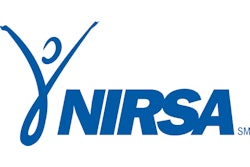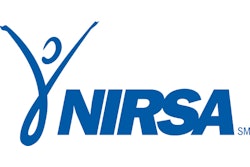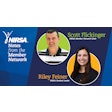We work when other people play: That's our business. Rec services need to be convenient, and it should be convenient to do business with us.
 Consider offering swim lesson registration on the same day the prior session ends. (Photo courtesy of Bloomingdale Park District)
Consider offering swim lesson registration on the same day the prior session ends. (Photo courtesy of Bloomingdale Park District)We work when other people play: That's our business. Rec services need to be convenient, and it should be convenient to do business with us.
It's amazing how many facility operators seemingly forget this. Are you one of them? Do you scoff at the idea of online registration? Do you fail to offer a program or service because you can't find anyone to work it? Do you close your front office at noon so that staff can eat lunch together? Do your doors shut at 4:30 p.m. because your staff wants to go home before 5? Is your gym closed on school holidays and breaks?
In this uncertain economy, people are working harder and are more pressed for time, and many businesses have figured out that convenience is the key to success. Bankers, grocery stores, hotels and pharmacies are making their services available to customers armed with smartphones and laptops, and they're providing multiple services under one roof. Many more businesses, including health clubs, are making it possible to do business with them 24 hours a day. Bloomingdale (Ill.) Park District's own recent needs-assessment survey found that convenience outweighs price as well as many other key factors in determining residents' participation in rec programs.
As recreation professionals, what can we learn and appropriately implement in our organizations to be more convenient to our customers? Consider the following:
-
People don't want to drive very far to get where they are going. Location itself can be perceived as inconvenient, and if you factor in ludicrous gas prices, location can be perceived as super-inconvenient. If you serve a large town, consider offering duplicate programs at different times or in multiple locations, or bring your agency to your customer. In Bloomingdale, we offer aqua exercise classes at a local hotel's indoor pool, active adult programming in our senior living community's multipurpose room and daycare in a vacant store at our local mall during the holidays.
-
Thursday can be the new Friday. If weekends are successful for certain services like birthday parties or other programs, try offering those things on Thursdays. Many parents will accept Thursday events, because they know they only have to push through one more day of the week on Friday to get to the weekend.
-
Not all children go to bed at 8 p.m. Many people don't get home from work until 6 p.m. - therefore, they are not going to put their children in bed by 8. Offer programs later in the evening; you will be surprised by how successful they can be.
-
Registration can always be more convenient. Set up drive-thru registration and drop-off/pickup services. Parents who don't have to get out of the car and drag their two-year-old inside will be very happy. In Bloomingdale, we set up a table on the pool deck to sign up for the next session of swim lessons on the day the prior session ends. Allowing people to sign up right away while they are in the moment is much more effective than waiting until next week, when they will have forgotten all about it.
-
You have to get the word out. You have super-convenient hours, locations, programs. But can a total web neophyte easily find information about them on your site? Post this information repeatedly and in multiple places. Our office hours are posted on every page. Our services are promoted high in the web structure hierarchy - not buried on sub-sub-sub pages. Do you have an e-newsletter or Facebook page? Also, don't forget the real world - are hours, schedules and program information easy to find in your bricks-and-mortar building?
-
Different lifestyles suggest scheduling alternatives. Many agencies don't program on Sundays. Guess what - with birthday parties and sports crowding Saturday schedules, Sunday is often the only day families don't have something to do. Don't be afraid to offer programs at nontraditional times and on nontraditional days. Many children of divorced parents are with mom or dad every other weekend, meaning some drop-in programs will do better if they don't take place every week.
Parents always face difficulties scheduling activities for their kids of different ages. Offer and promote classes for multiple age groups at the same time and location, and think about building in some free time for mom. In Bloomingdale, we created "On the Spot" swim lessons. During open swim, several swim instructors are ready and waiting to give children a half-hour private swim lesson (for a higher rate than our regular private lesson) without any prior registration or reservation.
-
Transportation is an inhibitor to some groups' participation. Transportation should always be part of your focus on convenience. For your senior population, consider free rides or valet parking. For youths, consider bundling services. Two districts near us have shown sensitivity to these user groups' transportation issues. Supervisors at Streamwood Park District coordinate with senior centers to offer classes at their facilities, since it's clear that seniors are more likely to sign up when the program is offered where they live. Roselle Park District provides transportation to summer camp after swim lessons, so that kids can take part in two activities without their parents having to worry about how to get them from one program to the other.
-
You can charge for it. It's true - people will pay more for services that are convenient. Open your fitness center at 5 a.m., or keep your after-school care open until 6:30 p.m. rather than 6, and people will happily pay for it.
The customer's view is really very simple: It's all about me. Your focus should be on this before you renew your focus on convenience. You and your staff think you know what is convenient for your customers, but it wouldn't hurt to ask them. Spend the resources to do a needs-assessment, host a few focus groups, and review your program evaluations and customer feedback reports. Gather this key information to make your services more convenient.
Second, as a leader in an organization, you may already be considering your customers' need and desire for convenience - but are your staff members with you? With all due respect, it may really be difficult for some members of your team to be thinking about the convenience of your customers unless you instill this as a core value of the organization. I have seen both seasoned and new professionals disregard what is in the best interest of the customer because it isn't convenient to them personally, or they just don't feel like doing it.
This cultural shift is not easily implemented. It takes a real passion for "service above self" that comes from the top to drive a culture shift in any organization. Try holding a brainstorming session with your team, during which you evaluate each of your services solely based upon convenience factors. Invite your key frontline staff members who actually hear from your customers to suggest ideas that will make your services more convenient. You will be surprised with the results, positive ideas and potential changes you can make to the way that you do business.
Whether you're the director, the superintendent, a recreation supervisor or on the parks maintenance staff - don't be afraid to stand up and lead this charge. The outcome will be improved service and increased revenue.




































